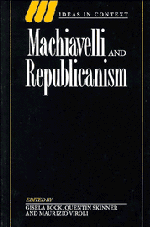Book contents
- Frontmatter
- Contents
- List of contributors
- Acknowledgements
- I MACHIAVELLI AND THE REPUBLICAN EXPERIENCE
- 1 Machiavelli and Florentine republican experience
- 2 Machiavelli and the crisis of the Italian republics
- 3 Florentine republicanism in the early sixteenth century
- 4 Machiavelli, servant of the Florentine republic
- 5 The controversy surrounding Machiavelli's service to the republic
- II MACHIAVELLI AND REPUBLICAN IDEAS
- III MACHIAVELLI AND THE REPUBLICAN HERITAGE
- IV THE MORALITY OF REPUBLICANISM
- Index
- Title in the series
2 - Machiavelli and the crisis of the Italian republics
Published online by Cambridge University Press: 05 July 2011
- Frontmatter
- Contents
- List of contributors
- Acknowledgements
- I MACHIAVELLI AND THE REPUBLICAN EXPERIENCE
- 1 Machiavelli and Florentine republican experience
- 2 Machiavelli and the crisis of the Italian republics
- 3 Florentine republicanism in the early sixteenth century
- 4 Machiavelli, servant of the Florentine republic
- 5 The controversy surrounding Machiavelli's service to the republic
- II MACHIAVELLI AND REPUBLICAN IDEAS
- III MACHIAVELLI AND THE REPUBLICAN HERITAGE
- IV THE MORALITY OF REPUBLICANISM
- Index
- Title in the series
Summary
It is impossible in Machiavelli's writings not to feel the pressure of the events of his time. His reflections and his political proposals refer directly to those events. Hence scholars, although using very different criteria for their interpretations, have often considered Machiavelli's major writings to be a direct and passionate response to the crisis of the republics or, on a wider plane, to that of the small Italian states – a crisis which he lived through without being able to witness its final outcome. This is the dominant theme in Federico Chabod's classic work on The Prince. But this same general conception already underlies Pasquale Villari's and Oreste Tommasini's massive nineteenth-century biographies, in which the Florentine secretary's life, his writings and his ‘times’ are tightly interwoven. This basic interpretation has recently been used, for instance, by Corrado Vivanti, who considers the Discourses to be not a theoretical work, but rather a concrete political proposal, a sort of manifesto for refounding the Italian republics in a political situation in which it was not yet clear what the final outcome would be. ‘Machiavelli and the crisis of the Italian republics’ is hence much too broad and much too widely debated a problem for me to be able to discuss it without restricting it somewhat and without making some preliminary remarks.
- Type
- Chapter
- Information
- Machiavelli and Republicanism , pp. 17 - 40Publisher: Cambridge University PressPrint publication year: 1991
- 3
- Cited by



